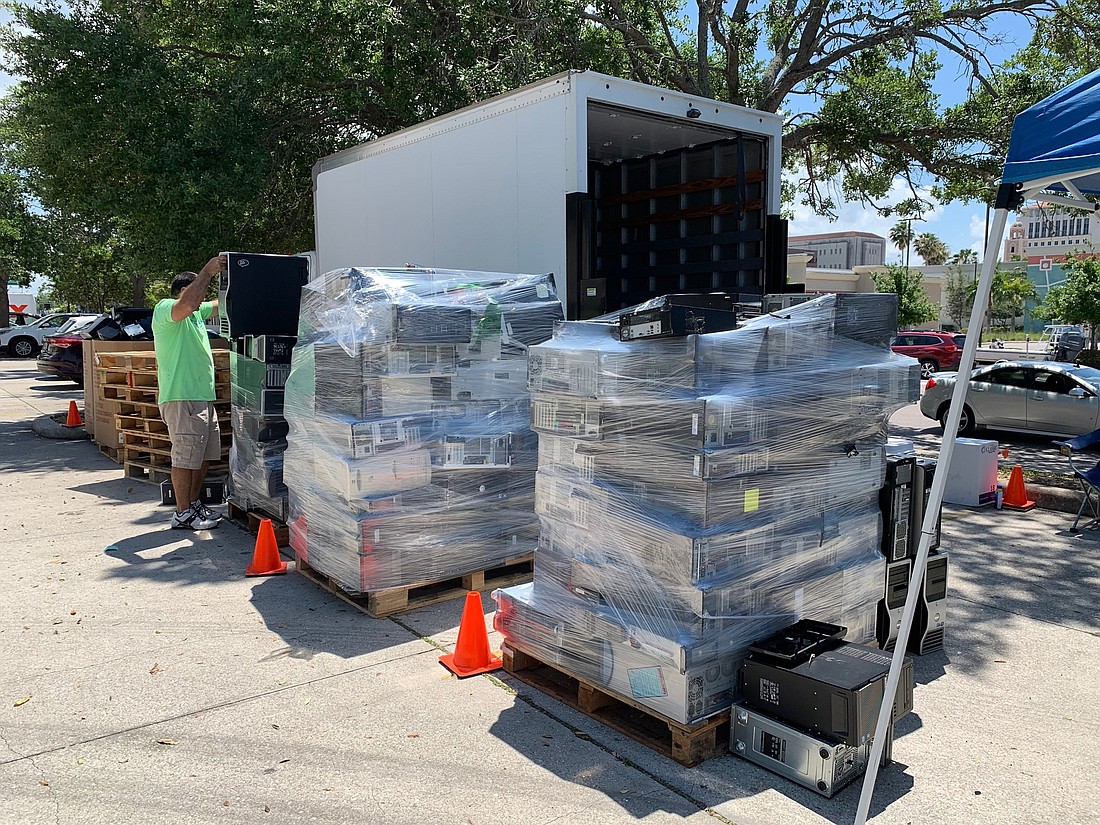- November 15, 2024
-
-
Loading

Loading

Anyone with cellphones, laptops and computers piling up at home has a chance to properly recycle them.
SouthTech, an IT services company serving businesses in Southwest Florida, is partnering with the Lakewood Ranch Business Alliance to host a free data dump in Lakewood Ranch from 8 a.m. to 1 p.m. Oct. 11 in the Main Street at Lakewood Ranch west parking lot near Town Hall.
“Businesses that may have computers or other electronics laying around, which I think a lot of us do because technology changes so quickly, have an opportunity to responsibly dispose of them free of charge,” said Dan Sidler, director of communications for the Lakewood Ranch Business Alliance.
The data dump will allow people to recycle their electronics to ensure their information is destroyed and won’t end up in a landfill, which causes negative environmental impacts.
“We figured if we’re going to expect all of our clients to upgrade all of their devices every three, four years for security reasons, we have to make sure the stuff they do have doesn’t end up in a landfill somewhere because it’s incredibly bad for the environment,” SouthTech Marketing Coordinator Lauren Selle said. “We figured if we want our clients to do it, we guarantee there are people who aren’t our clients sitting on a bunch of technology they might want to get rid of.”
Putting items in the trash bin on a computer doesn’t mean the information is deleted.
Selle said all information on a computer or laptop is stored on the hard drive and can be accessed even if someone can’t see it on the screen.
“If you give your computer to something like Goodwill without someone having properly wiped the hard drive, and if someone wants to, they can go into your hard drive, access everything you thought you deleted,” Selle said. “They can basically wreak havoc with your identity.”
Destroying a hard drive makes it physically impossible for anyone to get into the drive and access information including passwords to emails, social media accounts and banking information.
Quicksilver Recycling Services, a Tampa-based electronics recycling company, will have technicians on-site to destroy hard drives using a punch method. They will punch an 1 ½ inch hole in diameter into the center of the hard drive, which shatters the platters holding the information.
“That ensures their information is destroyed, and it’s not going off somewhere to who knows who,” said Jim Lawler, the vice president of sales for Quicksilver Recycling Services. “It gives them a good sense of comfort.”
Mobile phones are more complicated to take apart, so Quicksilver will collect them in secured, locked bins and bring them to Tampa to remove memory cards and dispose of them internally.
With many people having banking apps and email access on their cellphones, Selle said if someone obtains a phone passcode, they can access information.
“Mobile phones are good with encryption when you’re using them, but the encryption only works so long as you have your passcode,” Selle said.
Selle suggests replacing devices, such as work laptops, every three or four years and keeping up to date on when operating systems are at their end of life support, which means the companies aren’t providing security patches leaving devices vulnerable.
“Technology is changing all the time,” she said. “If you’re operating on a laptop that’s three years old, you could potentially be running into security risks.”
Thousands of devices are making their way into landfills rather than being properly recycled.
SouthTech has between 100 and 150 managed clients, including the Observer Media Group, and asks all employees of those companies, which could be anywhere from five to 100 people, to upgrade their devices every few years.
“That’s easily over 1,000 devices every three, four years that, if you dump it in a landfill, is just going to sit in a landfill forever because the plastic doesn’t degrade, and the metals are bad for the environment,” Selle said. “We want to make sure we’re not contributing to that at all.”
Electronics contain numerous toxic materials, such as lead, mercury, cadmium and beryllium.
“If they go into a landfill that’s not a hazardous waste landfill, what happens is these electronics will react with soil and water and actually leach into the aquifer system,” he said.
Lawler said recycling is the simple and right action to take when disposing of electronics because it will not only help the environment but also allow for some of the same raw materials to be repurposed and sold again.
“If we’re able to mine gold, silver and platinum through electronics, there’s less need for us to mine it organically,” Lawler said. “These materials come full circle.”
Electronic waste can produce toxic byproducts in air, water and soil if not properly disposed.